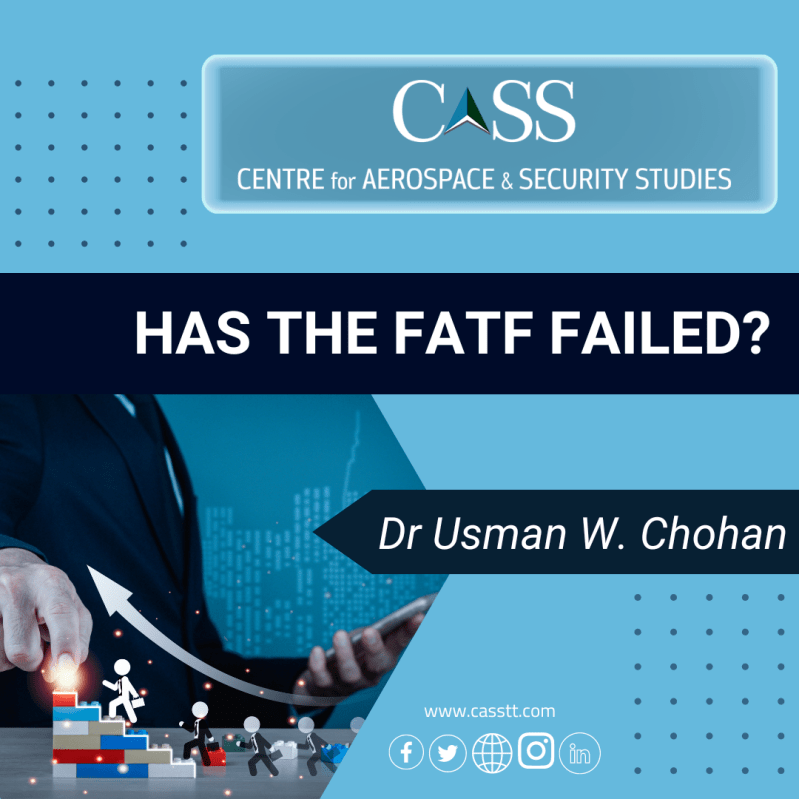The Financial Action Task Force (FATF) is an inter-ministerial body that aims to curtail international money laundering and terrorist financing by setting standards for national financial architectures. It is a voluntary body comprising 40-odd countries, with affiliate regional groups including the Asia-Pacific Group (APG), which Pakistan joined as a Senior Associate (but not full) Member.
Created in 1989, the FATF was a prescient idea in its recognition that the illegal flow of money around the world would create havoc in an increasingly interconnected world, particularly as the Cold War was ending and former Warsaw Pact countries were facing challenges of integration into the global financial system. Over the years, the scope and standards of the FATF have grown, incorporating anti-money laundering as well as terrorist financing.
Given the lapse of thirty years, we can fast forward to today and examine its current initiatives. Above all, the FATF poses a threat to move Pakistan, already on its ‘grey list’ of countries, to full blacklisting. This would have significant impact for the Pakistani economy, the banking system, the flow of remittances, on philanthropic organizations, on individual accounts, on the flow of foreign investment, and on our negotiations with international organizations such as the IMF.
As such, the FATF has a loaded gun pointed at the entire Pakistani financial architecture under two violent premises: first, that economic sanctions against an entire country that can compel it to fix a complex and amorphous financial architecture are short quarterly deadlines; second, that the entire Pakistani economy must assume a collective guilt for a trifling small group of people or organizations that might pose “a significant threat to the global financial system.”
This leads us with the right question to ask; whether the FATF is really doing the job it was intended to do or is it actually curtailing “significant threat to the global financial system ?Has money laundering or terrorist financing gone down in the past 30 years since the FATF has been around.
The answer is that, by any indication, the amount of black money floating around the global shadow economy has exploded both in absolute terms, as well as relative to the total global money flows, in the past 30 years. Economists are reticent to provide exact estimates, given the inherently shadowy nature of black money, but the scale of the problem has expanded in to the trillions of dollars. The Panama Papers, the Paradise Papers, and litany of other exposés have begun to paint a picture of a world that the FATF, in misdirecting its violence towards Pakistan, seems largely oblivious to.
But whereas the FATF has failed on that account, the real question is why the FATF has fallen so short of its stipulated objectives. Evidently, the FATF has been looking in all the wrong places. If the FATF truly cared about international money laundering and dark money, it would most certainly be waging a war against the Cayman Islands, the Bahamas, Vanuatu, Guernsey, Gibraltar, the British Virgin Islands, and Delaware. Indeed, the greatest centers of non-transparent financial gimmickry and suspect acts are not in Third World nations. They are in fact right at the heart of Western capitalism: in locations such as London, New York, Delaware, and Frankfurt.
This can be illustrated in countless ways, but a very recent example of Deutsche Bank, the largest financial institution in the largest European country, is particularly illuminating. It has been recently revealed that between 2011 and 2014, Deutsche Bank had laundered more than 175 million euros (more than 28 billion rupees at the current exchange rate) for Russian organized crime syndicates. Internally labelled the “Russian Laundromat” scheme, the prestigious German bank was engaged in precisely the sorts of activities which the clueless FATF, based not very far away in Paris, was meant to stop. But instead of the extremely politicized FATF, it was in fact a proactive consortium of journalists – civil society at its best – that forced these revelations into the public and compelled Deutsche Bank to admit to its fraudulent money laundering practices.
So while dirty money is flowing through the swankiest Western capitals, countries such as Pakistan are being forced into impossible deadlines to transform their financial systems at the risk of externally-imposed sanctions. A parallel can be drawn between the FATF and the Western “human rights lobby” which shrills down to developing countries how they should behave while turning a blind eye to serious infractions in their own territories, or how their own industries (e.g. Western weapons and arms industries) boil the pot of turmoil in the first place. The FATF similarly asks countries such as Pakistan to “do more” without accepting due culpability of the OECD countries which not only tolerate but in fact thrive on an international shadow banking system.
Instead of lambasting traditional bête-noires including Iran, North Korea, Myanmar, and now possibly Pakistan, perhaps the FATF should actually focus on the roots of the problem of black money in the world. When that happens, the tremendous failures of the now irredeemably politicized FATF will point to fact that the worst culprits in the world’s shadow economy don’t wear long black beards and black turbans, but swanky black ties and striped black suits.
The writer is the Director for Economics and National Affairs at the Centre for Aerospace and Security Studies (CASS). He can be reached at cass.thinkers@casstt.com




